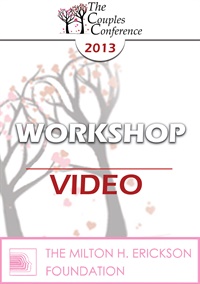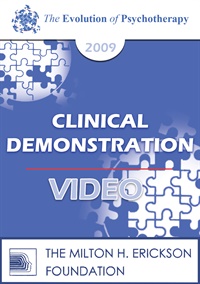- Average Rating:
- Not yet rated
- Topic Areas:
- Psychotherapy | Keynotes | Intimacy | Mindfulness | Love | Couples Therapy | Neuroscience
- Categories:
- Couples Conference | Couples Conference 2012
- Faculty:
- Rick Hanson, PhD
- Course Levels:
- Master Degree or Higher in Health-Related Field
- Duration:
- 59:50
- Format:
- Audio and Video
- Original Program Date:
- Apr 29, 2012
- Short Description:
- To compensate for the brain’s innate negativity bias – making it like Velcro for negative experiences but Teflon for positive ones, which sensitizes couples to hurts and conflicts and undermines psychotherapy – we’ll explore a vital method in self-directed neuroplasticity: identifying key positive experiences and then registering them deeply in implicit memory.
- Price:
-
Sale is $29.00
price reduced from Base Price - $59.00
- Average Rating:
- Not yet rated
- Topic Areas:
- Couples Therapy | Workshops | Marriage | Relational Life Therapy Model (RLT) | Mindfulness | Relationships
- Categories:
- Couples Conference | Couples Conference 2013
- Faculty:
- Terry Real, LICSW
- Course Levels:
- Master Degree or Higher in Health-Related Field
- Duration:
- 1:28:11
- Format:
- Audio and Video
- Original Program Date:
- Apr 19, 2013
- Short Description:
- Terry Real’s Relational Life Therapy ™ deals with the most stuck, most intractable cases by dealing squarely with issues of character. His Relationship Bootcamp begins with this slogan: “Other Workshops Teach You Skills: We Deal With the Part of You That Won’t Use Them.” WHAT you do matters less than WHICH PART OF YOU is at the wheel—the mature, present part of you, or an immature, triggered part of you. “We teach individuals in couples how to be relational—changing each individual’s character as we change the relationship between them.”
- Price:
-
Sale is $29.00
price reduced from Base Price - $59.00

- Average Rating:
- Not yet rated
- Topic Areas:
- Neuroscience | Attachment | Workshops | Experiential Therapy | Mindfulness | Couples Therapy
- Categories:
- Couples Conference | Couples Conference 2016
- Faculty:
- Rob Fisher, MFT
- Duration:
- 01:54:14
- Format:
- Audio Only
- Original Program Date:
- May 13, 2016
- Short Description:
- Now that you understand the neuropsychology of attachment, how are you going to use it in a session where one partner is yelling at the other for abandoning him/her who is in turn trying to take refuge under the coach? Learn how to put theory into practice using an experiential approach to explore old neural circuitry around attachment and build new pathways. We will be using the present moment and mindfulness integrated into therapy to slow things down and rewire the brain.
- Price:
- $15.00 - Base Price

Credit available - Click Here for more information
- Average Rating:
- Not yet rated
- Topic Areas:
- Couples Therapy | Mindfulness | Keynotes | Conflict | Relationships
- Categories:
- Couples Conference | Couples Conference 2021 | Online Continuing Education
- Faculty:
- Ellyn Bader, PhD | Caroline S. Welch
- Course Levels:
- Master Degree or Higher in Health-Related Field
- Duration:
- 58 Minutes
- Format:
- Audio and Video
- Original Program Date:
- Jun 05, 2021
- Short Description:
- Couples therapist Ellyn Bader and Mindsight Institute CEO Caroline Welch will explore how mindfulness can provide an accessible, useful tool in couples therapy, not only for the therapist, the two individuals, and their relationship, but also for the therapeutic process. Mindfulness can be practically applied through Caroline Welch’s 3Ps approach of Purpose, Pivoting, and Pacing to cultivate more resilience which is important to cultivate in couples therapy.
- Price:
- $29.00 - Base Price

Credit available - Click Here for more information
- Average Rating:
- Not yet rated
- Topic Areas:
- Couples Therapy | Relationships | Anxiety | Continuing Education | Mindfulness | Topical Panels | Treatment Planning
- Categories:
- Couples Conference | Couples Conference 2021 | Online Continuing Education
- Faculty:
- Helen LaKelly Hunt, PhD | Caroline S. Welch | Stan Tatkin, PsyD, MFT | Shawn Giammattei, PhD
- Course Levels:
- Master Degree or Higher in Health-Related Field
- Duration:
- 58 Minutes
- Format:
- Audio and Video
- Original Program Date:
- Jun 06, 2021
- Short Description:
- Acting out is a response to anxiety, and such behavior can be targeted to a partner. Methods of assessing and addressing acting out will be covered.
- Price:
- $29.00 - Base Price
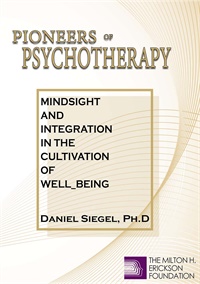
- Average Rating:
- Not yet rated
- Topic Areas:
- Clinical Demonstrations | Psychotherapy | Relationships | Mindfulness | Neurobiology
- Bundle(s):
- Pioneers of Psychotherapy Bundle
- Categories:
- Pioneers of Psychotherapy | Evolution of Psychotherapy | Evolution of Psychotherapy 2009
- Faculty:
- Daniel Siegel, MD
- Course Levels:
- Master Degree or Higher in Health-Related Field
- Duration:
- 00:56:00
- Format:
- Audio and Video
- Original Program Date:
- Dec 10, 2009
- Short Description:
- Daniel Siegel (2009) Mindsight and Integration in the Cultivation of Well-Being demonstrates interpersonal neurobiology therapy with a volunteer studying to be a therapist. She has experienced fear in one clinical setting and has also been “the glue,” holding together her family since she was young. Siegel uses the triangle of relationship/ mind/brain to help the volunteer experience her fear of responsibility by allowing images and body sensations to flow to “soften the mind.”
- Price:
- $59.00 - Base Price
- Average Rating:
- Not yet rated
- Topic Areas:
- Dialogues | Mindfulness | Psychotherapy
- Categories:
- Evolution of Psychotherapy | Evolution of Psychotherapy 2005
- Faculty:
- Marsha Linehan, PhD | Jean Houston, PhD
- Course Levels:
- Master Degree or Higher in Health-Related Field
- Duration:
- 58:42
- Format:
- Audio and Video
- Original Program Date:
- Dec 09, 2005
- Short Description:
- Dialogue 01 from the Evolution of Psychotherapy 2005 - Mindfulness Featuring Marsha Linehan, PhD and Jean Houston, PhD Moderated by Ellyn Bader, PhD
- Price:
-
Sale is $29.00
price reduced from Base Price - $59.00
Tags: Mindfulness Psychotherapy
- Average Rating:
- Not yet rated
- Topic Areas:
- Clinical Demonstrations | Mindfulness | Psychotherapy
- Bundle(s):
- Learning Track - Mindfulness
- Categories:
- Evolution of Psychotherapy | Evolution of Psychotherapy 2009
- Faculty:
- Daniel Siegel, MD
- Course Levels:
- Master Degree or Higher in Health-Related Field
- Duration:
- 54:43
- Format:
- Audio and Video
- Original Program Date:
- Dec 11, 2009
- Short Description:
- Daniel Siegel (2009) Mindsight and Integration in the Cultivation of Well-Being demonstrates interpersonal neurobiology therapy with a volunteer studying to be a therapist. She has experienced fear in one clinical setting and has also been “the glue,” holding together her family since she was young. Siegel uses the triangle of relationship/ mind/brain to help the volunteer experience her fear of responsibility by allowing images and body sensations to flow to “soften the mind.”
- Price:
- $59.00 - Base Price
Tags: Mindfulness Psychotherapy
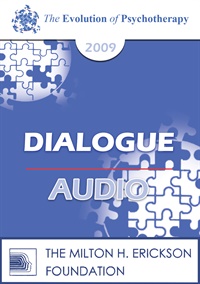
- Average Rating:
- Not yet rated
- Topic Areas:
- Dialogues | Mindfulness | Psychotherapy
- Categories:
- Evolution of Psychotherapy | Evolution of Psychotherapy 2009
- Faculty:
- Stephen Gilligan, PhD | Steven Hayes, PhD
- Duration:
- 58 Minutes
- Format:
- Audio Only
- Original Program Date:
- Dec 12, 2009
- Short Description:
- EP09 Dialogue 10 – Mindfulness in Therapy – Stephen Gilligan, PhD and Steven Hayes, PhD Educational Objective: Given a topic, to describe the differing approaches to psychotherapy, and to identify the strengths and weaknesses of each approach.
- Price:
- $15.00 - Base Price
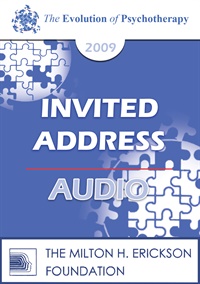
- Average Rating:
- Not yet rated
- Topic Areas:
- Invited Addresses | Mindfulness | Dialectic Behavior Therapy (DBT) | Psychotherapy
- Categories:
- Evolution of Psychotherapy | Evolution of Psychotherapy 2009
- Faculty:
- Marsha Linehan, PhD
- Duration:
- 52 Minutes
- Format:
- Audio Only
- Original Program Date:
- Dec 11, 2009
- Short Description:
- With her Dialectical Behavioral Therapy, Marsha Linehan was one of the first practitioners to show how East and West could meet in the consulting room. She will address how critical it is that psychotherapists strive for both a well-being of our clients and the scientific validation of our methods.
- Price:
- $15.00 - Base Price
Please wait ...



